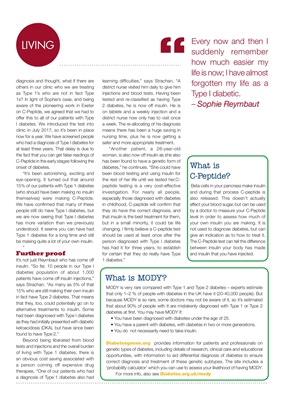
LIVINGLIVING
diagnosis and thought, what if there are
others in our clinic who we are treating
as Type 1's who are not in fact Type
1s? In light of Sophie's case, and being
aware of the pioneering work in Exeter
on C-Peptide, we agreed that we had to
offer this to all of our patients with Type
I diabetes. We introduced the test into
clinic in July 2017, so it's been in place
now for a year. We have screened people
who had a diagnosis of Type I diabetes for
at least three years. That delay is due to
the fact that you can get false readings of
C-Peptide in the early stages following the
onset of diabetes.
"It's been astonishing, exciting and
eye-opening. It turned out that around
15% of our patients with Type 1 diabetes
(who should have been making no insulin
themselves) were making C-Peptide.
We have confirmed that many of these
people still do have Type I diabetes, but
we are now seeing that Type I diabetes
has more variation than we previously
understood. It seems you can have had
Type 1 diabetes for a long time and still
be making quite a lot of your own insulin.
"
Further proof
It's not just Reymbaut who has come off
insulin. "So far, 10 people in our Type I
diabetes population of about 1,000
patients have come off insulin injections,"
says Strachan. "As many as 5% of that
15% who are still making their own insulin
in fact have Type 2 diabetes. That means
that they, too, could potentially go on to
alternative treatments to insulin. Some
had been diagnosed with Type I diabetes
as they had initially presented with diabetic
ketoacidosis (DKA), but have since been
found to have Type 2."
Beyond being liberated from blood
tests and injections and the overall burden
of living with Type 1 diabetes, there is
an obvious cost saving associated with
a person coming off expensive drug
therapies. "One of our patients who had
a diagnosis of Type 1 diabetes also had
learning difficulties," says Strachan, "A
district nurse visited him daily to give him
injections and blood tests. Having been
tested and re-classified as having Type
2 diabetes, he is now off insulin. He is
on tablets and a weekly injection and a
district nurse now only has to visit once
a week. The re-allocating of his diagnosis
means there has been a huge saving in
nursing time, plus he is now getting a
safer and more appropriate treatment.
"Another patient, a 26-year-old
woman, is also now off insulin as she also
has been found to have a genetic form of
diabetes," he continues. "She could have
been blood testing and using insulin for
the rest of her life until we tested her.Cpeptide testing is a very cost-effective
investigation. For nearly all people,
especially those diagnosed with diabetes
in childhood, C-peptide will confirm that
they do have the correct diagnosis, and
that insulin is the best treatment for them,
but in a small minority, it could be life
changing. I firmly believe a C-peptide test
should be used at least once after the
person diagnosed with Type I diabetes
has had it for three years, to establish
for certain that they do really have Type
1 diabetes."
MODY is very rare compared with Type 1 and Type 2 diabetes - experts estimate
that only 1-2 % of people with diabetes in the UK have it (20-40,000 people). But
because MODY is so rare, doctors may not be aware of it, so it's estimated that
about 90% of people with it are mistakenly diagnosed with Type 1 or Type 2 diabetes
at first. You may have MODY if:
• You have been diagnosed with diabetes under the age of 25.
• You have a parent with diabetes, with diabetes in two or more generations.
• You do not necessarily need to take insulin.
Diabetesgenes.org aims to provide information for patients and professionals on
genetic types of diabetes. It includes details of research, clinical care and educational
opportunities along with information to aid differential diagnosis of diabetes to ensure
correct diagnosis and treatment of these genetic subtypes.
For more info, also see Diabetes.org.uk/mody
What is MODY?
Beta cells in your pancreas make insulin
and during that process C-peptide is
also released. This doesn't actually
affect your blood sugar, but can be used
by a doctor to measure your C-Peptide
level in order to assess how much of
your own insulin you are making. It is
not used to diagnose diabetes, but can
give an indication as to how to treat it.
The C-Peptide test can tell the difference
between insulin your body has made
and insulin that you have injected.
What is
C-Peptide?
"Every now and then I
suddenly remember
how much easier my
life is now; I have almost
forgotten my life as a
Type I diabetic.
- Sophie Reymbaut